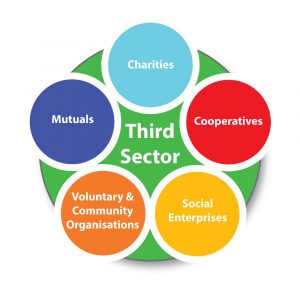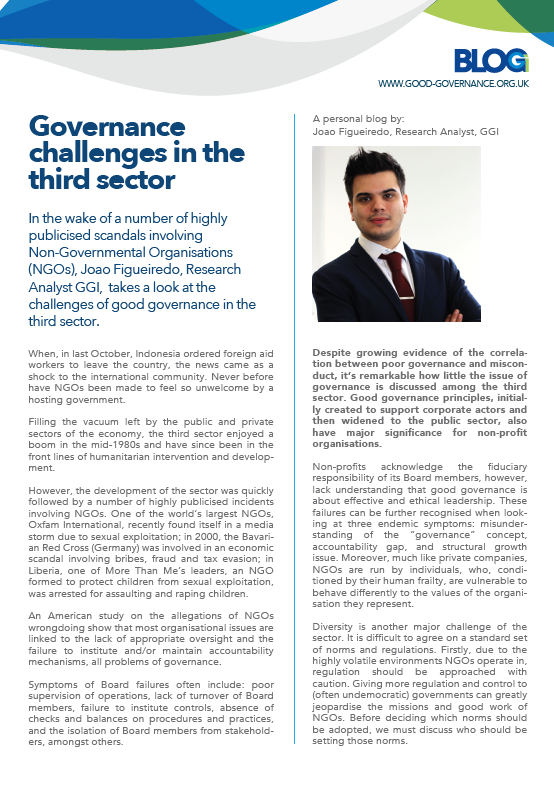#TrusteesWeek, this week, encourages us to reflect on the state of the third sector
05 November 2019

Independent of government, third sector organisations are values-driven, motivated by the desire to achieve social goals – for example, to improve public welfare, the environment or economic wellbeing – rather than by the desire to distribute profit.
Less theoretically, and much more bluntly, the third sector plays a vital role in meeting some of society’s unmet needs and, without it, we’d all be stuffed. NCVO’s excellent civil society almanac[1] reinforces the sheer scale and scope of the sector. In 2016/17, there were approximately 196,000 voluntary organisations in the UK, 167,000 of them in England and Wales. Nine in ten UK households have accessed services provided by voluntary organisations at some point. The value of volunteering was estimated at £23.9bn in 2016.
People need the brightest lights in their darkest hours. Through care and advocacy, people can find relief and a sense of belonging; and through the arts, culture and sport, people’s spiritual and emotional needs can be sated. At its most elevated, the collective state of ‘charity’ reflects the fundamental status of community and nation[2].
Sadly, though, these are trying times for the sector. It finds itself being expected to do more in response to demand, need and limited finances in public services, but often in the absence of the rigours of sound governance and with the backdrop of political, economic and social uncertainty and its inevitable impact on levels of contribution and donation.
The Civil Society Strategy, launched by the Government in August 2018, grants charities formal permission to speak in public debate and promotes the sector’s role in shaping policy. That is a good thing, but the reality is that for many charities, survival is front and centre of their thinking, above and beyond anything else.
Research into the sector describes how:
- 65% of charities are facing increased demand but 39% have only the same or fewer resources[3].
- Over half of charities are uncertain about being operational in the near future[4].
- Government grants are being replaced by Government contracts, which are much more difficult to attain and bring new performance expectations.
- There is a significant and growing disparity between small, local charities and large, national charities[5]. The overall income in 2015/16 was £47.8 billion, an increase of £1.6 billion from the previous year, but 3% of the organisations received 80% of the sector’s income and only 18% saw their income grow in that period.
Boards everywhere are grappling with big issues that may not have existed when their institutions were formed: impact, marketing, digital, GDPR, partnership, engagement.
Those are challenges that GGI can help the sector to consider. The public’s esteem for and confidence in the sector can only be assured if boards continue to steer their ships with equal attention to delivery and behaviour. The Charity Governance Code[6] provides a useful starting point for self-assessment and development.
Ultimately good governance has its roots in personal energy and collective behaviour. During Trustees’ Week, we celebrate both volunteering and what it means to be a volunteer. It is something you do because it picks up on something deep inside you, a life experience or a passion or a profound sense of responsibility and belief to which you feel you must respond.
I am proud to play a small direct part in the sector with Teenage Cancer Trust, The Donna Louise Children’s and Young People’s Hospice, and Partners in Paediatrics. Like for so many others, it’s personal experience that has led me to those roles and it’s when I’m a trustee that my heart sings at its loudest. I am humbled, inspired and reminded constantly that “rewarding” needn’t be about money.
As Winston Churchill said,
“We make a living by what we get, but we make a life by what we give”.

[1] NCVO (2019) UK Civil Society Almanac 2019. Data. Trends. Insights.
[2] Populus, Charity Commission for England and Wales (July 2018) How the public views charities, what this means for the sector, and how trust can be increased
[3] Charity Finance Group, Institute of Fundraising and PwC (2016) Managing in the New Normal
[4] Local Charity and Community Group (2016) Sustainability Report
[5] NCVO (2018) UK Civil Society Almanac
[6] ACEVO, Association of Chairs, ICSA, The Clothworkers’ Company, NCVO, Small Charities Coalition, Barrow Cadbury Trust, WCVA (2017) Charity Governance Code

